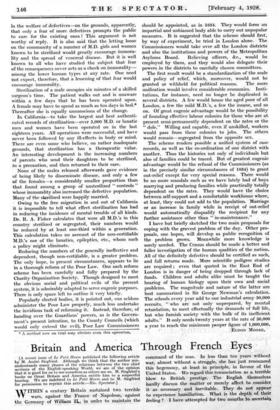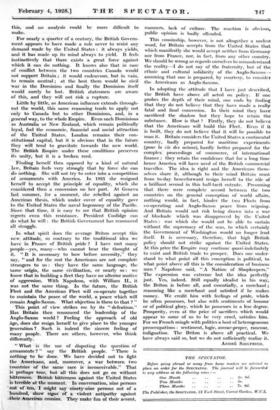Britain and America Through French Eyes [A recent issue of
Le Petit Havre published the following article by M. Andr6 Siegfried. Although we think that the author mis- understands many phases of the relations between the two chief sections of the English-speaking Werld, we are of the opinion 'that it is good for us to see ourselves as others see us. M. Siegfried's books on Great Britain and America entitle him to a respectful hearing. We are indebted to Le Petit Havre and to M. Siegfried for permission to reprint this article.—En. Spectator.] WITHIN a century Britain sustained two terrible wars, against the France of Napoleon, against the Germany of William 11., in order to maintain the command of the seas. In less than ten years without war, almost without a struggle, she has just renounced this hegemony, at least in principle, in favour of the United States. We regard this renunciation as a terrible blow to British prestige. The English themselves hardly discuss the matter or merely. affect to consider it as necessary. and inevitable. They do not appear to experience humiliation. What is the depth of their feeling ? I have attempted for two mouths to ascertain, this, and no analysis could be more difficult to make.
For nearly a quarter of a century, the British Govern- ment appears to have made a rule never to resist any deinand made by the United States : it always yields, and it has made up its mind always to yield. It feels instinctively that there exists a great force against which it - can do nothing. It knows also that in case of conflict between the two countries Canada would not support Britain ; it would endeavour, but in vain, to remain neutral ; at the best there would be civil -War in the Dominion and finally the Dominion itself would surely be lost. British statesmen are aware Of this, and they will not risk a rupture.
• Little by little, as American influence extends through- out the world, this same reasoning tends to apply not only to Canada but to other Dominions, and, in a general way, to the whole Empire. Even such Dominions as Australia or New Zealand, which remain politically loyal, feel the economic, financial and social attraction of the United States. London remains their con- stitutional capital, but it is obvious that in the future they • will tend to gravitate towards the new world. The British Empire under these conditions preserves ifs unity, but it is a broken reed.
Finding herself then opposed by a kind of natural law, Britain feels very . strongly that . by force she can do nothing. She will not try to enter into a competition of armaments, with America. In 1921 she resigned , herself to accept the principle of equality, which she 'considered then a concession on her part. At Geneva .
.suipmer, for a _moment, . she rebelled against an Anierican thesis, which under cover of equality gave "to the United States the naval hegemony of the Pacific. Since that time, it is easy to see that British opinion 'regrets even this resistance. President Coolidge can do what he will : the British Government has renounced all Struggle.
In. what spirit does the average Briton accept this new attitude, so contrary to the traditional idea we have in France of - British pride ? I have met many , people—yes, manywho cannot bear the thought of it. " It is necessary to bow before necessity," they say, " and, for the rest the Americans are not complete strangers to us : they have the same language, the Same origin, the same civilization, or nearly so : we know that in building a fleet they have no ulterior motive of aggression, With Napoleon, with William II., it 'was not the same thing. In the future, the British Fleet and the American Fleet will co-operate together to maintain the peace of the world, a peace which will remain Anglo-Saxon. What objection is there to that ? "
• This point of view strikes me by its " defeatism." Has Britain then renounced the leadership of the Anglo-Saxon world ? Feeling the approach of old age, does she resign herself to give place to the younger generation ? Such is indeed the sincere feeling of many people. There are others, however, who think differently.
" What • is the use of disputing the question of armaments ? " say the British people. " There is nothing to be done. We have decided not to fight the Americans, and, moreover, a war between two Countries of the same race is inconceivable." That is perhaps true; but all this does not go on without bitterness. British bitterness against the United States is terrible at the moment. In conversation, nine persons "Out of ten, I might say ninety-nine persons out of a hundred, show signs of a violent • antipathy against .heir Ameriean cousins. They make fun of their accent, manners, lack of culture. The reaction is obvious, public opinion is badly offended.
This cousinship, however, is not altogether a useless word, for Britain accepts from the United States that which manifestly she would accept neither from Germany nor from France, nor, in fact, from any other country. We should be wrong as regards ourselves to misunderstand the reality—I do not say of the fraternity, but of the ethnic and cultural solidarity of the Anglo-Saxons-- assuming that one is prepared, by courtesy, to consider the Americans as Anglo-Saxons.
In adopting the attitude that I have just described, the British have above all acted on policy. If one probes the depth of their mind, one ends by finding that they do not believe that they have made a really fatal and final concession. In their mind they have sacrificed the shadow but they hope to retain the substance. How is that ? Firstly, they do not believe that the Americans will build this Fleet. Even if it is built, they do not believe that it will be possible to man it. Britain considers the United States a continental country, badly prepared for maritime experiments (pour la vie des oceans), hardly better prepared for the complex proceedings of commerce, of international finance ; they retain the confidence that for a long time hence America will have need of the British commercial traveller. The idea is right and the Americans them- selves share it, although to their mind Britain must from to-day. henceforward resign herself to the role of a brilliant second in this half-tacit entente. .Presuming that there were complete accord . between the two countries on the general conception of world affairs, nothing would, in fact, hinder the , two .Fleets from co-operating and Anglo-Saxon peace from reigning. And Britain would not risk being -drawn into . a war of blockade which was disapproved by the United States : war which she would not be able to sustain without the supremacy of . the seas, to which certainly the Government of Washington would no longer lend itself. It is necessary, therefore, that high British policy should not strike against the United States. At this price the Empire may continue quasi-indefinitely to exist and British trade to prosper. Does one under- stand to what point all this conception is political, to what point above all this is the consideration of business men ? Napoleon said, " A Nation of Shopkeepers." The expression was extreme but the idea perfectly just. Yes, indeed. Still equally idealist in his way, the Briton is before all, and essentially, a merchant ; reasoning like a merchant and satisfied if he makes money. We credit him with feelings of pride, which he_ often possesses, but also with .sentiments of honour or of political glory, which he possesses in a less degree. Prosperity, even at the price of sacrifices which would appear to some of us to be very cruel, satisfies him. For we French mingle with politics a host of heterogeneous preoccupations : sentiment, logic, amour-propre, rancour, indignation. The Briton is above all practical. We have always said so, but we do not sufficiently realize it.
ANDRA SIEGFRIED.







































 Previous page
Previous page